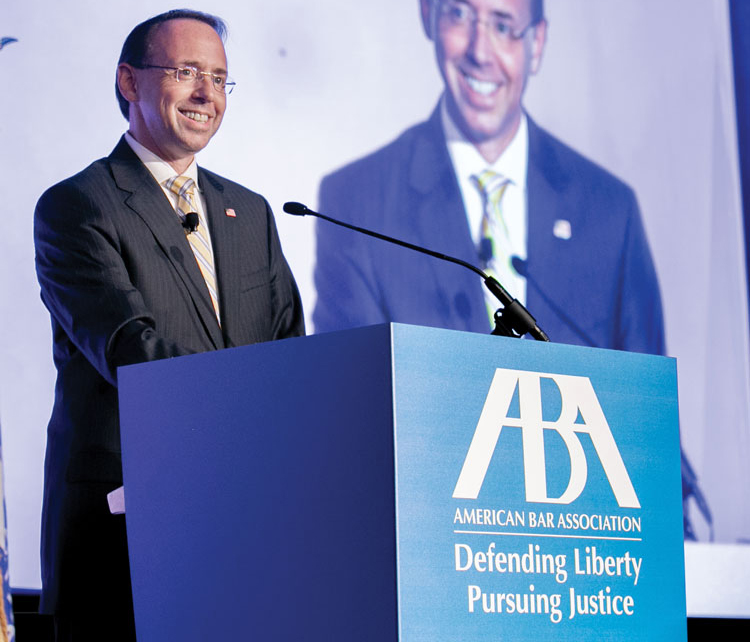Rosenstein defends zero-tolerance immigration policy

Photo of Deputy Attorney General Rod Rosenstein by Kathy Anderson.
Deputy Attorney General Rod Rosenstein received a rock-star welcome during the opening forum of the ABA Annual Meeting.
Speaking to a standing room-only crowd, Rosenstein received multiple standing ovations as he discussed the importance of preserving and promoting the rule of law while defending U.S. Department of Justice policies regarding efforts to combat foreign meddling in U.S. elections and the recent zero-tolerance policy on illegal immigration.
“The rule of law is indispensable to a thriving and vibrant society,” he stated. “It shields citizens from government overreach. It allows businesses to invest with confidence. It gives innovators protection for their discoveries. It keeps people safe from dangerous criminals. And it allows us to resolve differences peacefully through reason and logic.”
In a Q&A session with then-ABA President Hilarie Bass, Rosenstein affirmed his belief that zero tolerance was consistent with the rule of law, and that the DOJ was simply doing its job in enforcing the laws and treating everyone equally.
“It would be wrong to say we’re prosecuting everyone without regard to the law,” said Rosenstein, who also stated that there were large numbers of people “blatantly violating the immigration laws of this country.” He added that “if the facts of the law justify prosecution, then we’re committing the resources to ensure everyone is treated equally rather than picking and choosing who will be prosecuted.”
CLASSIFIED ACTIONS
Rosenstein also assured those in attendance that federal agencies are doing a lot to combat foreign meddling in elections and propagation of fake news. “Because a lot of the information we learn is from classified intelligence, there’s a lot we don’t talk about publicly,” Rosenstein said.
He noted that federal agencies—including the FBI, DOJ and Department of Homeland Security—are constantly briefing state and local election officials about cyberthreats and attacks. He also said federal agencies are taking steps to combat hacking of political campaigns and candidates and pointed to the July indictment of 12 Russian nationals by Special Counsel Robert Mueller as evidence of this commitment.
When asked about the opioid crisis and safe injection sites as a means of combating the ongoing issue, Rosenstein was dismissive.
“It’s illegal; it’s a crime,” he said. “I think you can anticipate that if someone would try that in the U.S., they would face litigation by the Department of Justice and they wouldn’t have much of a defense.” Adding that while he was “100 percent committed” to prevention and treatment, he said he believed these sites sent the wrong message, giving illegal and dangerous drugs the imprimatur of government approval.
The embattled deputy attorney general has become a central figure in the ongoing probe into Russian interference during the 2016 presidential election. Confirmed in his post by a 94-6 vote in the U.S. Senate in April 2017, he soon found himself a fixture in the news. A couple of weeks after confirmation, he authored a memo recommending that FBI Director James Comey be fired. Less than 10 days later, he appointed former FBI director Mueller as special counsel overseeing the Russia investigation after Attorney General Jeff Sessions recused himself.
Since then, Rosenstein has been under near-constant pressure to fire Mueller amid reports that he could also be fired, and he has become a target of House Republicans.
Rosenstein basked in his warm reception while making light of some of his recent battles. Noting that Robert H. Jackson—attorney general from 1940 to 1941 before being appointed to the U.S. Supreme Court—once remarked about the unpleasantness of dealing with congressional inquiries, Rosenstein drew laughs from the audience when he stated that he could relate.



